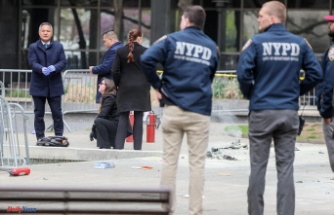Darío Villanueva, former director of the Royal Spanish and Academic Academy, spent time observing an abnormality. It is in speech, in Scripture, in social relations, in behaviors, in almost everything. That abnormality was increasing in recent years and entered new elements to play on an increasingly perverse board. The term with which this irregularity embraced comes from a few decades ago, but in recent years he took momentum. It is political correction, one of the forms of postmodern censorship. To know a little more the background, the reasons and consequences dedicated years of listening, reading and study. And from there came an essay: to bite his tongue. Political correction and posverdad (espasa). A highlighted trial today with the Francisco Threshold Award to the book of the year, endowed with € 12,000 and add a bronze sculpture from Alberto Heart.
Bulls, deceptions and new language trends are the materials on which Villanueva deploys its certainties and suspicion. Each of these malformations is charged under a general umbrella: political correction, which in principle is not exercised as always censorship by political power or churches but by gaseous entities emerged from civil society, who do not take you to the Prison but propitiate implacable discredit and stigmatization campaigns. What is called: cancellation. "All this extends at this time as a 'human spot', to say it with a title of the American novelist Phillip Roth," explains Darío Villanueva. "The political choreline was born in the 60s in some university spaces in the US and dresses that Herbert Marcuse called the 'repressive tolerance', which is a concept as bold as paradoxical."
But worrying, says Villanueva (professor of theory of literature at the University of Santiago de Compostela), is how political power has been appropriating the mechanics of this perverse correction to apply it in turn as a censorship mode. "At the end it is a loop." A loop having resistance forces. "Fortunately I see a reaction to all this, and I believe that one of the popular moments of the protest against cancellation, the correction and others was the manifesto published by the US magazine Harper's Bazaar - in July 2020 -, signed by writers as Margaret Atwood, John Banville, Salman Rushdie, Martin Amis and JK Rowling; and intellectuals like Noam Chomsky, Gloria Steinem or Enrique Krauze. That's why I do not have a pessimistic sensation on this matter. "
Nor in the solvent media see alarm Villanueva. "Leo interesting contributions on this problem, there are gallarded answers to this situation, against that correction that is censorship." The incidence in the language of correction, trap, post-true and other poisons is one of the spaces of study in which the author 'bite the language' has explored. "The conclusion is that there are inviable fashions that will end up disappearing." What do you mean? "Inclusive male, I understand that the gender double is used in certain issues to better clarify things, but hinders a lot when its use is required as an imposition in each case when it is unnecessary, time will polish it and settle down"
And where are we going? "At the moment towards the certainty that the great claims of the history of humanity can not be resolved reduced to microoreivations by identity groups. To which this has taken us, among other things, it is to the matter of cultural appropriation, which It proposes such crazy indignations as that of criticizing the President of Canada, Justin Trudeau, for a photo of youth in which he appeared disguised as Aladdin. "
Among the theses of Villanueva is also that political correction, post-return compromises the limits between reality and fiction. "Because it is no longer worth the scrutiny of reason or even common sense, the words no longer serve to designate what exists. Aristotle is not given when he says that false is saying that what it is, is not it , and that what is not, is. and true, that what it is, is, and what is not, is not ".
Among the winners at previous occasions are the Patria, Fernando Aramburu (2016) books; South, from Antonio Soler (2018); Rightings, from Mario Vargas Llosa (2019) and the Wonders, by Elena Medel (2020).
The jury -Ingraded by Manuel Llorente, Carlos Aganzo, César Antonio Molina, Fernando R. Lafuente, Fanny Rubio and Santos Sanz Villanueva- Highlights that after transition, Saints Juliá, this is the second time this award is granted to an essay . "In this case, a relevant reading work in these moments of dismissal and confusion of society." A society shaped on some fronts by the double bottom, the threat, the trick and the superchery. Above all policy. Incorrect policy.
Date Of Update: 11 January 2022, 10:07











